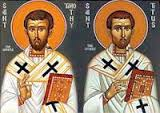Homily (Reflection) for Monday of the
Fourth Week in Ordinary Time (I) (30th January, 2017) on the Gospel
Heb 11:32-40;
Ps 30:20-24 (R. v.25);Mk 5:1-20.
Topic: Go and tell your friends.
 On arriving at the other side of the sea, a man with an
unclean spirit whom nobody could restrain met Jesus. The gospel reads,
On arriving at the other side of the sea, a man with an
unclean spirit whom nobody could restrain met Jesus. The gospel reads,
When he saw Jesus from a distance, he ran and bowed down
before him; and shouted at the top of his voice, ‘What have you to do with me,
Jesus, Son of the Most High God? I adjure you by God, do not torment me (Mk 5:6-7).
And at their plea Jesus allowed them to enter the swine
numbering about two thousand that were feeding and they all rushed down the
steep bank into the sea, and were all drowned.
When the news broke in the city, people came and saw Jesus
and the demoniac clothed and in his right mind sitting there, they were afraid.
They begged Jesus to leave their neighbourhood. Although the man who was
possessed by demons wanted to follow Jesus but He said to him, “Go home to your
friends, and tell them how much the Lord has done for you, and what mercy he
has shown you” (Mk 5:19). The man
went and did exactly what he was told and people were amazed.
Most often many understand evangelizers as those who move
from place to place, or one parish or station to another and so on probably
putting on distinguishing dresses (habits). And for some, an evangelizer is
that man or woman who goes about with megaphone through the streets, houses,
markets, among other places telling people to repent.
Evangelizing does not necessarily involve these but primarily
making others know God and His goodness, cf. Jn 20:17. In other words, Jesus asked the man to go and evangelize.
Let us all fulfil our obligation to evangelize by telling those in our
families, schools, workplaces, and so on that the Lord is good. By doing this
we will gather people with and for Christ, cf. Matt 12:30.
Bible Reading: Ps 21.
Thought for today: You are an evangelizer.
Let us pray: God, help us to make others know you
better – Amen.
You are free to share this reflection
with others if you consider it worthy.
For more homilies (reflections):
Join our WhatsApp Group via: +234 810 298 6313
To Contact and/or to support this
ministry:
Tel: +234 813 305 0302
+234 905 655 4466
May
God bless you all+






